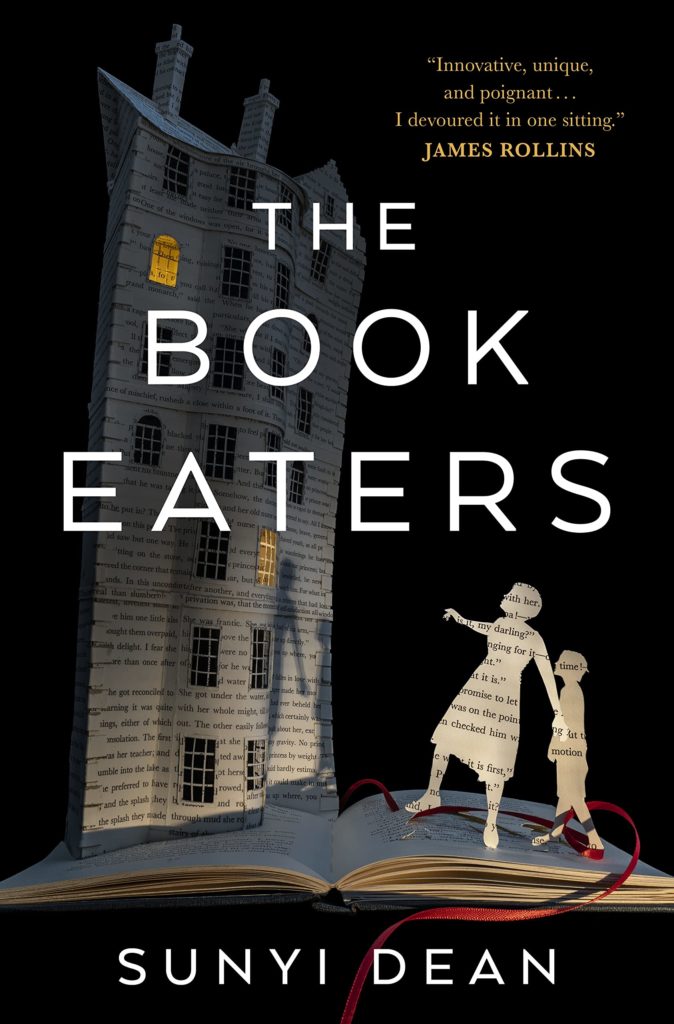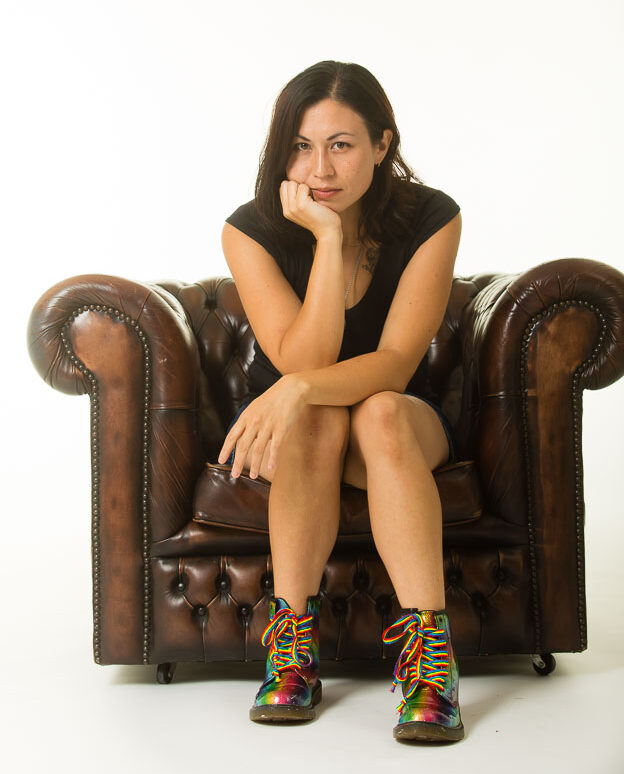Having absolutely devoured The Book Eaters, I knew I had to ask Sunyi Dean if she would chat with me about it. This book is phenomenal. It has a unique and intriguing mystery and fantasy element as well as detailed character work. Keep reading this author interview to find out what my burning questions were!
About The Book Eaters

Out on the Yorkshire Moors lives a secret line of people for whom books are food, and who retain all of a book’s content after eating it. To them, spy novels are a peppery snack; romance novels are sweet and delicious. Eating a map can help them remember destinations, and children, when they misbehave, are forced to eat dry, musty pages from dictionaries.
Devon is part of The Family, an old and reclusive clan of book eaters. Her brothers grow up feasting on stories of valor and adventure, and Devon—like all other book eater women—is raised on a carefully curated diet of fairytales and cautionary stories.
But real life doesn’t always come with happy endings, as Devon learns when her son is born with a rare and darker kind of hunger—not for books, but for human minds.
(Disclaimer: Some of the links below are affiliate links. For more information you can look at the Policy page. If you’re uncomfortable with that, know you can look up the book on any of the sites below to avoid the link)
Find The Book Eaters on Goodreads, Amazon, Indiebound, Bookshop.org & The Book Depository.
Author Interview
The socialization of women is a prevalent theme in your book, how did this idea of who was allowed to devour which books arise in terms of your world building? When you thought of your world did you always know that this was going to be an aspect?
I think I always knew it would be an aspect – it feels like a very big part of books and reading in general.
I was a hyperlexic autistic as a child (a super early reader), and my parents encouraged me to read as much as possible. However, being very religious and conservative, they also placed restrictions on what kind of books they thought were suitable, above and beyond age-appropriate limits. Books that were too ‘secular’ or which promoted inappropriate values were strongly discouraged. My father has a particular dislike for anything he feels is overtly feminist or queer. It was only in adult years that I could look back at the stories I grew up loving and turn a critical eye on what they were saying, and look at the effect they’d had.
Society in general is acutely aware that the ideas we’re exposed to can shape the course of our lives, and a lot of educational philosophy debates what kids are allowed to access, and when. In addition to that, reading material is often very gendered, and unnecessarily so. People used to buy diggers/trucks books for my son, and princess or fairytale ones for my daughter. But the biggest fairytale here is strict gender roles themselves.
The mother and child relationship in THE BOOK EATERS is incredibly complex. How was it to write this relationship not only for Devon and her child, but also for Devon and her family?
I’ve met vanishingly few people in real life who have happy and straightforward relationships with their parents or kids. Family is so hard! Children do not love their parents in the same way that parents love their children, and I think that’s key–the relationship is being built from two very different foundations.
The area I tried most to nail was how a relationship changes by degrees over time. One of the things I most enjoy about Jane Eyre is how her relationships with her family evolve so much across her life, and this happens with Devon, too: her indifference to her mother, her closeness to her father-figure, which slowly inverts into a sense of loss for her unremembered mother, and a hatred for her father-figure. Both of those focus her on her son, I think.
There are some quotes throughout your book, how did you choose these quotes and from the beginning of drafting were they always there?
Some I knew I wanted to include, and some I went looking for after the chapters were written. I had a document of quotes I found interesting or remembered from stories I liked, and dipped into that as needed.
In our panel, we chatted about Devon and her morality, how do you think Devon sees herself? You play around a bit with timelines in THE BOOK EATERS which gives us more insight into Devon’s life before now, how was the drafting process of this specific aspect?
A guy recently wrote a scathing review where he claimed TBE was “women good, men bad” and I genuinely found that hilarious – I do not think Devon was ever written to be heroic! Devon knows she is a terrible person, but her perspective is that all people are terrible. Some try harder than others to be better, but no one exists without causing harm.
I loved working with dual timelines. I’m naturally an underwriter (not the insurance kind, but the “my wordcount is too low” kind) and to compensate for that, I need to have multiple arcs going on–either multi-timeline, or multi-pov. It can definitely be awkward to juggle, though,
The power of imagination is essential in THE BOOK EATERS in the ways in which we can never fight for a different future if we can’t imagine it. Did this theme emerge through writing or did you always know this was going to be something you wanted to write about?
I love this question – you’re right that it was very central. It was definitely a theme that emerged during the drafting and was refined during revision, and it’s also something I think about often. CS Lewis once said that humans are like a child making mud pies in a slum, who refuses the offer of a holiday by the beach because we just can’t imagine anything that good. He was talking about religion, but I think his metaphor can be repurposed for a lot of things.
Humanity is only ever one generation away from utopia. We just don’t work towards it because we can’t imagine it, and so don’t believe it. To me, that is the real power of fiction, especially scifi and fantasy. It forces us to confront things, good and bad, that we think can’t ever happen. Scifi has predicted devastating climate change since the 1950s, and also shown us what a society with universal basic income might look like (as two examples.)
Did you ever consider a different setting for THE BOOK EATERS? What was your favorite or least favorite element of the setting?
No, I felt strongly it had to be set in Britain, particularly the north of England. The setting is partly a tribute to the moors and wild places of Yorkshire, but a lot of the ideas Devon is engaging with are rooted in British myths and Gothic victorian traditions. I also love the juxtaposition in England of gritty inner cities and bleak wilderness beauty; it felt very appropriate for the story.
Who is your favorite side character? Or maybe not favorite, but who was the most fun or intriguing to write?
Ramsey’s two chapters were far and away my favorite to write. He was added in late, I think in the second or third editing pass with Tor, because he solved lots of story issues for me (namely, that Devon can’t know what is going on behind the scenes with him.) At that point, I had such severe fatigue with writing adn was really tired of the book! so writing something “newish” was really refreshing. But also, Devon must keep the reader at arm’s length to hide her secrets and not spoil the twists, whereas Ramsey you’re inside his head and under his skin. I much, much prefer to write in super close POV.
Find The Book Eaters on Goodreads, Amazon, Indiebound, Bookshop.org & The Book Depository.
About the Author

Sunyi Dean (sun-yee deen) is an autistic author of fantasy fiction. Originally born in the States and raised in Hong Kong, she now lives in Yorkshire with her children. When not reading, running, falling over in yoga, or rolling d20s, she sometimes escapes the city to wildswim in lonely dales.
Her short stories have featured in The Best of British Scifi Anthology, Prole, FFO, Tor Dot Com, etc., and her debut novel, THE BOOK EATERS, will be published Aug 9th, 2022 by Tor (USA) and Harper Voyager (UK). Available at all good bookstores, in ebook, hardback, and audio.